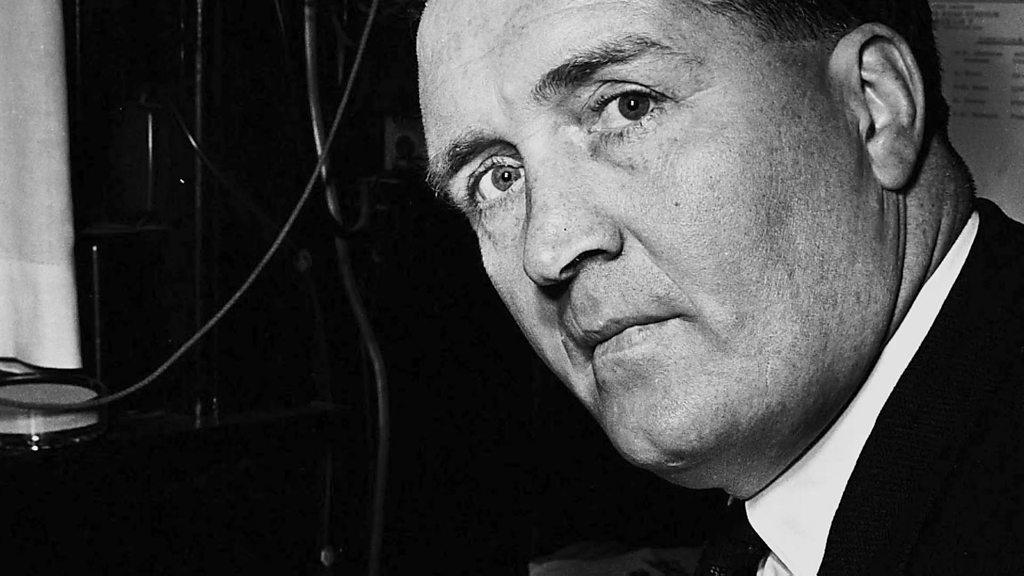Glasgow 1967: The Lisbon Lions captures a club, a city, a time
- Published
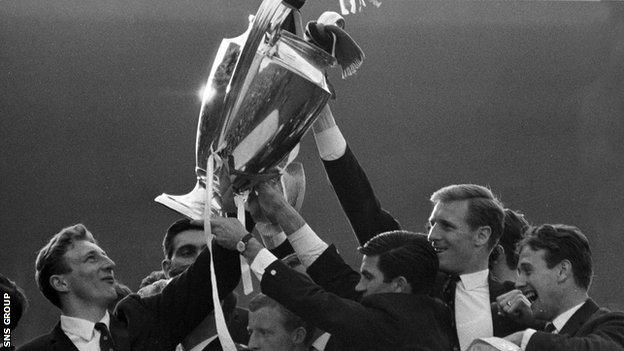
Celtic players show off the European Cup on their return to Glasgow
When you think about the epic sweep of the Lisbon Lions story, you have to wonder what was the greater of the miracles that happened back then - the fact that, 50 years ago, 11 local lads won the European Cup or the fact that, as a team, they existed at all.
Consider the roadblocks. Bobby Lennox - so shy as a kid he was embarrassed to play football in other people's company.
John Clark - his young life ruined by the death of his father in a railway accident.
Stevie Chalmers - so sick from tuberculosis-meningitis in his late teens and early 20s that he was given three weeks to live.
Jock Stein - left his job as Celtic reserve team manager on account of his religion, the Parkhead board telling him that as a Protestant he had gone as far as he could possibly go at the club.
Stein was in tears that day. So say a number of his former players in a documentary - Glasgow 1967 - about the Lions and the city they came from, to be aired on Wednesday on BBC One Scotland at 21:00 BST.
Jock Stein was initially told he couldn’t manage Celtic because he was non-Catholic
'Fifty years and they're still going on about it'
It's part football film, part social history, part dream come true, a Cinderella tale to match any Cinderella tale the global game has ever produced. So much has been said and written about them. A quick online search shows that at least 32 books, two plays and a novel have been penned in their honour.
In this past week, the newspapers have been full of supplements, fine journalism that came at the story from new angles. There are other documentaries available, there are CDs, there's a Lisbon Lions cushion, if you fancy it, there's a Lions tea towel, a Lions iPad cover, a Lions mouse mat.
On Sunday at Celtic Park, 60,000 people created a stunning visual display that evoked their legend. On Thursday, thousands more will gather at the SSE Hydro to do it all again, this time in the company of Sir Rod Stewart, Sir Alex Ferguson, Martin O'Neill, Gordon Strachan and others.
The story never gets old, the appetite never sated.
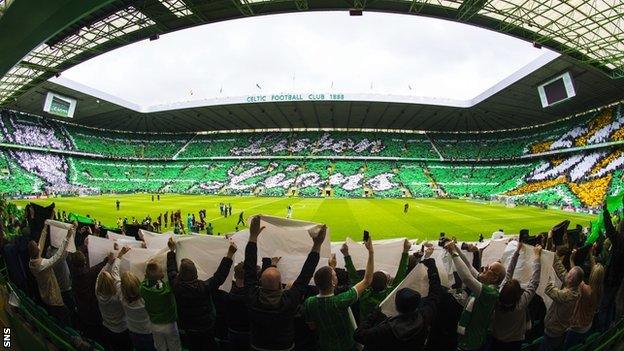
There's a simple and lovely moment close to the beginning of Glasgow 1967 when Willie Wallace, now living in Australia, revisits Celtic Park and wanders about its corridors. "Fifty years and they're still going on about it," he says with a smile on his face that spoke of pride, no doubt, but also amusement at all the fuss.
These lads didn't do fuss. They didn't consider themselves celebrities, just footballers, guys who adored the game and who were blessed with a talent and a hunger to succeed.
On that May day, Jimmy Johnstone, hot to trot, stared over at the bronzed athletes of Inter Milan as they took to the field in Lisbon and said to Bertie Auld: "Look at them, wee man, they're like film stars!"
And Auld's answer cut to the heart of the greatness that was about to show itself. "Aye, but can they PLAY?"
The Lions could play on a carpet and they could play on a ploughed field just as fluently. There's footage of them training on muck, not grass. That was the way of it. That was the norm. There's more footage of what tough economic times they lived in and yet amid the gloom this thing of beauty emerged.
'I wasn't getting married; I was going to the final'
Bertie Auld visits his old home in Panmure Street and shares memories of his childhood
The documentary is called Glasgow 1967 for a reason, for what shines through is the character not just of the players and their manager, but of their supporters and their city.
Humour courses through the narrative of Lisbon like a fast-running river. The emotion and the hilarity of the supporters elevates what happened to almost mythical proportions.
The fans are here in numbers. Ian Martin making a cup of tea in his kitchen and telling of the day he left for Lisbon in a Mini Cooper as part of a three-car cavalcade. "One of the boys in the other motor lost his suitcase even before he got to Bishopbriggs. It fell off the roof-rack."
There's Jimmy Quinn telling of an uncomfortable conversation with his fiancee. "I said, 'See this getting married carry-on, saving up for an engagement ring an' that, I want to go to the cup final. End of story'. She wasn't a bit pleased."
John Cowan was on a flight out of Glasgow that touched down uncomfortably close to kick-off-time. The doors of the plane swung open. The airline had no steps in place and the 19-year-old John didn't have the luxury of waiting - so he jumped.
"I sat down on the ledge and went for it," he recalls. "There was guys coming behind me. Dropping, dropping, dropping. And we started running towards the terminal."
'I never heard from Ghislaine again'
Celtic fans cram into cars in convoy for an almost 2,000 mile odyssey to Lisbon
God knows where Charlie Fryars and his mates were at this point, but Fryars' personal odyssey is a glorious illustration of the fact that, in many ways, there were more than 11 Lions in Lisbon.
Charlie tells part of his tale in the documentary, the full comic brilliance of it being told in a piece he has written for the ByTheMinute Celtic platform online. It begins when his mate, Gerry Loney, rings him up and offers him a seat in his Austin Cambridge, bound for Lisbon.
Charlie and Gerry plus Laurence Donnelly, John Hughes and Jim McDaid met at the Admiral Bar in Waterloo Street in Glasgow and hit the road. They had almost 2,000 miles to drive and three days to do it. That meant no hotel stops and as few comfort breaks as possible. Their first destination was Southampton to catch the boat to Cherbourg. They got as far as Lockerbie when the car broke down.
The explorers made the ferry, got some sleep on the four-hour crossing, drove down the Cotentin Peninsula and into Nantes where they had some beers in a bar near the station - and another kip. Not Charlie, though. Charlie was busy falling in love with a 19-year-old waitress called Ghislaine.
After half an hour, Ghislaine threw her arms around him and gave him a kiss. "She wanted my Celtic scarf and I said to her, 'No, we need it for hanging out the window." What greater love can one man have for his football club than to refuse to lay down his scarf for the gorgeous Ghislaine?
On they went - a thousand miles to go and only 33 hours left. Their exhaust pipe went near La Rochelle, but they got help and found a new one. They had a moment of weakness near San Sebastian, but they pulled back from the brink and carried on.
They came to the Portuguese border and it was closed for the night. The guards saw their colours and waved them through.
They made the kick-off, celebrated thunderously and then turned around and drove home. They were seven days on the road there and back, a whole week sleeping in the Austin Cambridge; unwashed, weary, but with memories that will sustain them for the rest of their lives. They didn't play that day in Lisbon, but what is that if not footballing heroism?
"When I got home," says Charlie, "I got my Celtic scarf and I parcelled it up and I wrote a letter to Ghislaine at Bar de la Garde, Nantes... I never heard from her." On that 4,000 mile trek, two happy endings was too much to hope for.
One was enough, more than enough. In this film, you marvel anew not just at what the Lions achieved, not just the lengths that 10,000 Celtic people went to in order to see them achieve it, but how powerful that achievement remains to this day, the magnitude of it passed on from father to son through the generations.
Glasgow 1967: The Lisbon Lions will be shown on BBC One Scotland at 21:00 on Wednesday 24 May. It can be seen in other parts of the United Kingdom at 23:20.
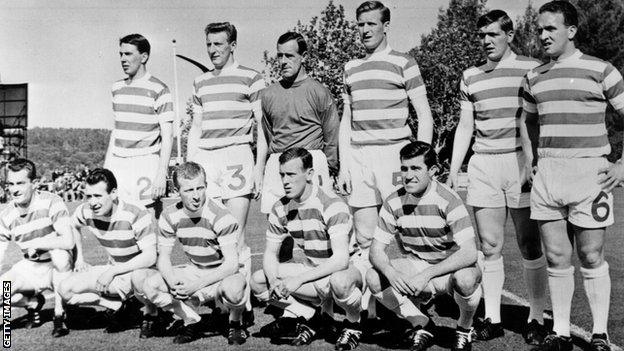
The Celtic team line up ahead of the 1967 European Cup final
- Published23 May 2017
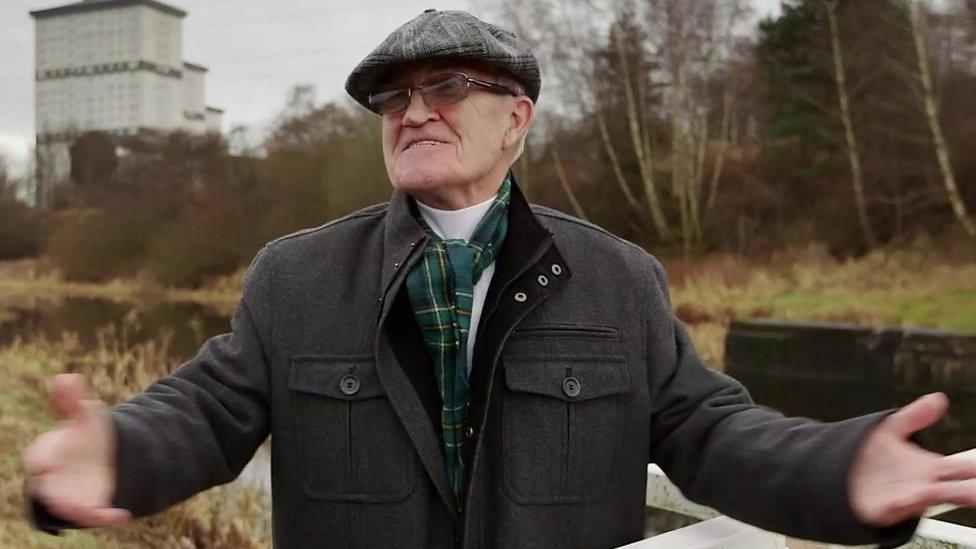
- Published23 May 2017
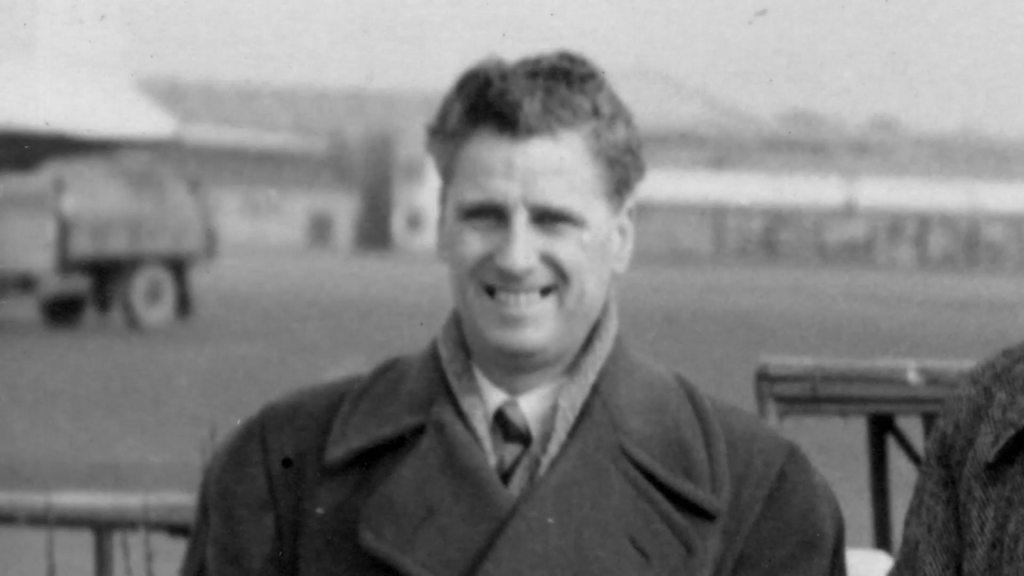
- Published22 May 2017
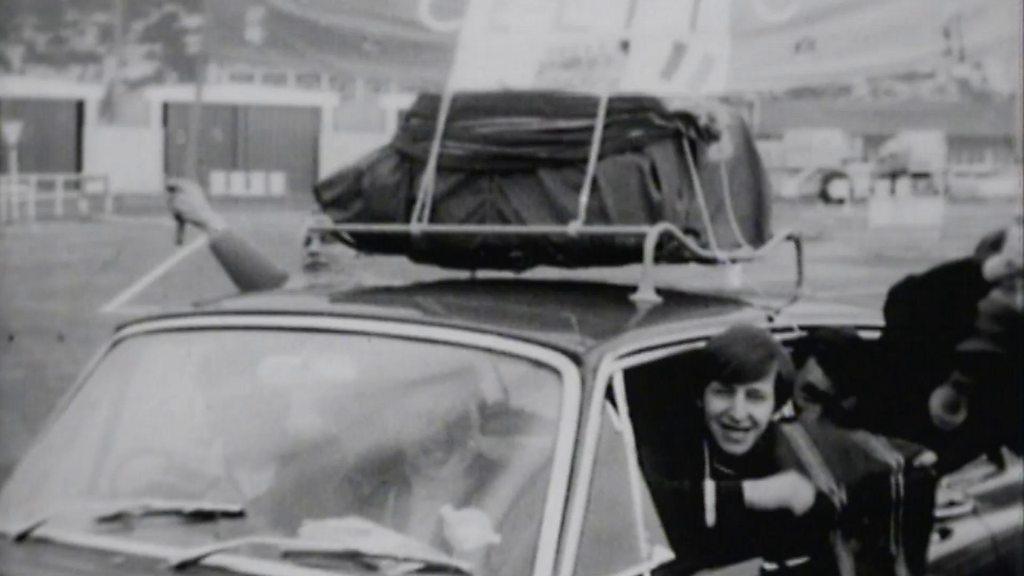
- Published22 May 2017
